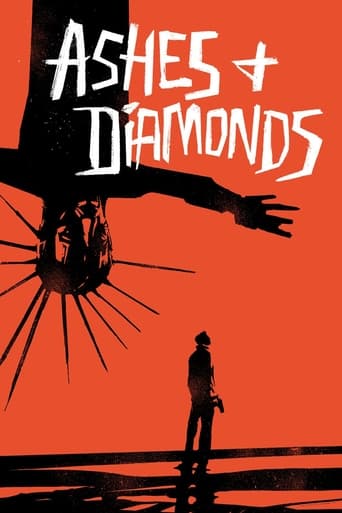Touched with the fire and rebellion of a new generation of Polish film makers
"Popiół i diament" (1958), directed by Andrzej Wajda and produced by Zespół Filmowy Kadr, is a seminal Polish film that delves into the tumultuous period immediately following World War II. Set on the final day of the war, the narrative follows Maciek Chełmicki, a young Home Army soldier tasked with assassinating a Communist leader. The film masterfully captures the moral and ideological conflicts faced by individuals caught between the fading hopes of a free Poland and the encroaching reality of Soviet domination. Wajda's use of stark black-and-white cinematography and dynamic camera work amplifies the tension and uncertainty of the era, making "Popiół i diament" a poignant reflection on the cost of war and the complexities of loyalty. The protagonist, Maciek, portrayed with intense vulnerability by Zbigniew Cybulski, embodies the internal struggle between duty and personal redemption. His character is a symbol of the lost generation, torn between the ideals of the past and the harsh realities of the present. The film's iconic scenes, such as Maciek's encounter with the barmaid Krystyna, highlight his yearning for a normal life, juxtaposed against his inevitable fate. This duality is further emphasized through the film's title, "Ashes and Diamonds," which alludes to the transient beauty and the destructive aftermath of war. "Popiół i diament" not only stands as a critical examination of post-war Poland but also as a universal commentary on the human condition. The film's exploration of themes such as betrayal, sacrifice, and the search for meaning in a chaotic world resonates with audiences beyond its historical context. Wajda's direction, combined with the compelling performances of the cast, creates a narrative that is both deeply personal and broadly relevant. The film's influence extends to the broader cinematic landscape, inspiring future filmmakers and contributing to the global appreciation of Polish cinema. Produced by Zespół Filmowy Kadr, "Popiół i diament" remains a testament to the power of film as a medium for social and political commentary. The studio's commitment to fostering innovative and thought-provoking cinema is evident in this work, which continues to be celebrated for its artistic merit and historical significance. As a cornerstone of Polish film history, "Popiół i diament" endures as a compelling narrative that challenges viewers to reflect on the enduring impact of war and the resilience of the human spirit.
Năm:1958
Thời lượng103 phút
Thể loạiPhim Chính KịchPhim Chiến TranhPhim Lãng Mạn
Các quốc gia sản xuấtPoland
